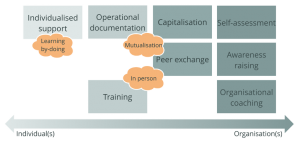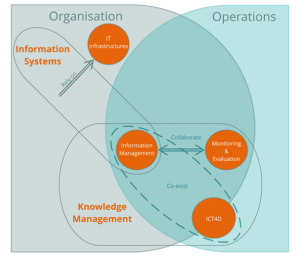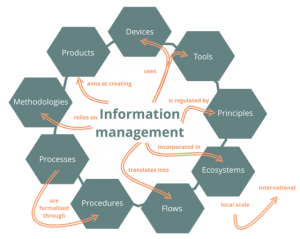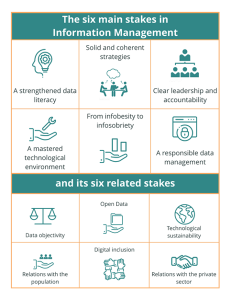Program Data: Practices and needs of francophone CSOs
Guest post from the team at CartONG

CartONG has just released a new study on “Program Data: The silver bullet of the humanitarian and aid sectors? Panorama of the practices and needs of francophone CSOs“.
What place for program data management in a sector in the throes of a digital revolution?
Mirroring our society, the Humanitarian Aid and International Development (HAID) sector is in the throes of a digital revolution. Whilst the latter is undeniably impacting day-to-day management of Civil Society Organisations (CSOs) – whether in their administrative duties or in those related to fundraising – it is also generating radical changes in actions being implemented for the benefit of populations.
Although it has become a key element in the coordination of operations, data management remains somewhat invisible from the perspective of the sector, in spite of its many ethical, financial and human implications, and above all its impact on project quality. In the field and at headquarters, project teams are therefore devoting an increasing amount of time to data management, often at the expense of other activities. Poorly trained and ill-equipped, these teams can produce substandard performances with regards to these tasks, and without the topic necessarily being regarded as an operational issue by most CSOs.
Program data management – also known as Information Management (IM) – is both a topical issue and the source of numerous debates within francophone Humanitarian Aid and International Development CSOs.
A unique study in the world of French-speaking CSOs
At present and to our knowledge, no equivalent study with a view to examining, as a whole, the practices of (francophone) CSOs, or to identifying their needs in terms of program data management, has yet been carried out. A number of analyses and articles do exist, yet these generally approach the subject either from a technical standpoint or as if these were still innovations for the sector and thus with limited constructive hindsight.
The organisational dimension is moreover relatively unexplored and very little consolidated data at the inter-CSO level is available. Lastly, although CSOs have been handling large amounts of data for almost 20 years, there remains much debate: what level of attention and investment should data management be subject to? Does the activity require a dedicated person in-house and, if so, which profile should be given priority? In fact, where does the scope of data management begin and where does it end? Do CSOs working in humanitarian situations have different needs than those working in a development context? Do differences in approach exist between francophone and anglophone CSOs, the latter often deemed more advanced in the field?
Based on a survey of CSOs, a literature review and interviews with key stakeholders, this study designed by CartONG aims to explore and provide preliminary answers to these questions. It also aims to make a valuable contribution to bolster the debate on data management. To this end, we have thereupon sought to synthesise and formalise often scattered and at times contradictory considerations.
The study is also available in French here.
What’s Program Data Management?
Based on the concept of Information Management (IM), program data management is a term whose scope of application continues to fluctuate and whose definition remains unclear. With a view to facilitating its ownership, readers of this new study will be given an accessible definition (synthesised in the diagram below) and a relatively small scope of application (see illustration below), at the juncture of Monitoring & Evaluation (M&E), Information and Communications Technologies for Development (ICT4D), information systems and knowledge management.

Main components of Information Management

Simplified diagram of the place of Information Management vis-à-vis related topics
Program data management & Francophone CSOs: an overview of the main stakes and of the existing relationships by categories of CSOs
Despite studies still being relatively sparse as to the link between project data management and project quality, the available evidence shows that good data project management makes for greater efficiency and transparency in organisations. The evidence gathered suggests, however, that project data management is widely used today for the benefit of bottom-up accountability – towards decision-makers and financial backers – rather than for day-to-day project steering.
evidence shows that good data project management makes for greater efficiency and transparency in organisations. The evidence gathered suggests, however, that project data management is widely used today for the benefit of bottom-up accountability – towards decision-makers and financial backers – rather than for day-to-day project steering.
The reasons for this state of affairs are manifold, but it appears that chief amongst them is a significant lack of maturity from francophone CSOs in matters relating to data and digital issues. Six main weaknesses and levers for action have thus been identified (see illustration):
- an insufficient data literacy within CSOs
- unduly fragile, siloed and insufficiently funded program data management strategies
- a lack of leadership and often overly vague responsibilities;
- a technological environment that is neither controlled nor influenced by CSOs
- the use of approaches that foster information overload and neglect qualitative data; and
- an under-estimation of the responsibilities carried by CSOs and of the ethical issues at stake with regard to the data they manipulate.
Confronted with these challenges, it appears that francophone CSOs are somewhat lagging behind – at least in terms of awareness and strategic positioning – compared to their anglophone counterparts. Moreover, program data management continues to be approached by the various CSOs in an inconsistent manner: the study therefore proposes a classification of CSOs and reflects on the main existing differences – between types, sectors and sizes – and in particular points out the difficulties encountered by the smallest organisations.
What types of IM support are expected by Francophone CSOs and on what priority themes?
This study was also an opportunity to identify both the type of materials and on which priority program data management themes a support is expected by francophone CSOs (see below); especially to enable specialized organisations, including H2H/Support CSOs such as CartONG, to better define their priorities of support toward CSOs.
The study also reveals that CSOs are mainly waiting for accompaniment on the following topics (in this order):
- selection of solutions
- responsible data management
- data quality control
- data analysis
- data sharing and, for the smaller ones also
- database design and
- simple map visualization.
What follow-up does CartONG intend to give to this study?
The study closes with a series of some fifteen recommendations to the various international aid and development actors, especially CSOs, who would benefit from being more proactive on the topic, as well as to donors and network heads who play a pivotal role to advance these issues.
By clarifying the various elements feeding the debate along with the issues at stake, we hope that this document – which remains a first for CartONG – will help feed current discussions. Many of them should actually be taken up again during the next GeOnG Forum that will be held online from November 2-3, 2020.
Carried out as part of the project Strengthening program data management within francophone CSOs carried out by CartONG (and co-financed by the French Development Agency – AFD over the 2020-2022 period), this study should be the subject of presentations during face-to-face or remote events before the year is out. It will also be enriched in the coming months by the release of many other resources.
Do not hesitate to follow us on social media or to write to us to be added to the project mailing list to stay informed.
- Twitter: https://twitter.com/assocCartONG
- LinkedIn: https://www.linkedin.com/company/1843125/
- Facebook: https://www.facebook.com/CartONG-95965973113
You might also like
-
What’s happening with GenAI Ethics and Governance?
-
Join the AI and African Evaluation Working Group Meet ‘n’ Mix Session on May 7!
-
Hands on with GenAI: predictions and observations from The MERL Tech Initiative and Oxford Policy Management’s ICT4D Training Day
-
When Might We Use AI for Evaluation Purposes? A discussion with New Directions for Evaluation (NDE) authors